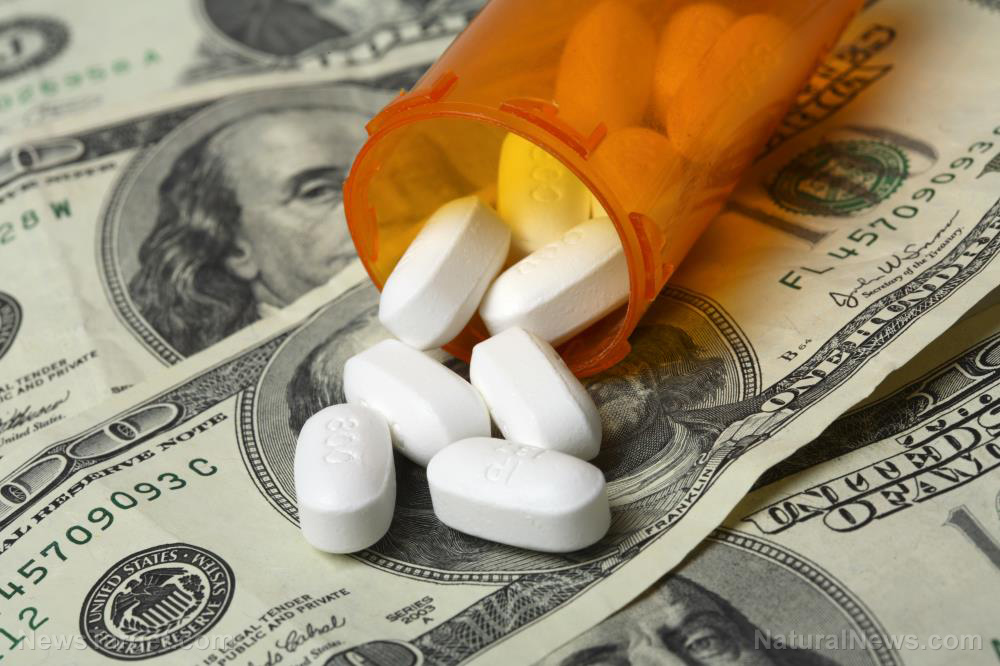Big Pharma’s BIG LIE: Most new drugs have zero new benefits, research confirms
09/04/2019 / By Isabelle Z.

No matter what ails you – real or imagined – there’s a drug for that. These days, stopping at the pharmacy on the way home from the doctor’s office has practically become a given. While you might think that medicine has simply evolved so much that we can now fix more problems than ever before, the truth is that the vast majority of new drugs aren’t backed by any evidence of added benefits.
In fact, a study carried out by the German Institute for Quality and Efficiency in Health Care found that more than half of new drugs that make their way into that country’s healthcare system show no additional benefit whatsoever.
They reached this conclusion after assessing 216 different drugs that were approved by regulators and entered the German market from 2011 to 2017. Not only did 58 percent of them offer no benefit over standard patient care, but just a quarter of them showed a significant added medical benefit according to the evidence available. Meanwhile, 16 percent provided a minor added benefit.
Psychiatric drugs have a particularly poor record in this regard, with just 6 percent of them offering any added benefit. Those that did offer a significant benefit tended to only provide such benefits to certain subgroups rather than the overall population of patients. A similar trend was seen in diabetes drugs, where only 17 percent showed added benefits.
Why are so many new drugs failing to live up to their promises?
The researchers cited three main reasons behind the lack of added benefits. The first is a straightforward absence of studies comparing new drugs with standard treatments for a particular disease. Another reason is that the available studies use an unsuitable control treatment, often because it hasn’t been approved for the patients under study. In other cases, the studies available might use suitable comparisons but simply don’t show clear advantages.
Accelerated drug approval processes often leave little time to gather meaningful data about the use of a particular drug that is up for approval. Although some in the healthcare industry, especially those who profit from medications, believe that the limited information available about drugs when they are approved is the tradeoff for getting new drugs to people who need them, the truth is that drugs are very rarely studied further after gaining that initial approval. In cases where something is later found to be ineffective, there is a serious lack of action on the part of regulators to rectify the situation.
The study’s authors wrote: “As a consequence, patients’ ability to make informed treatment decisions consonant with their preferences might be compromised, and any healthcare system hoping to call itself ‘patient centred’ is falling short of its ethical obligations.”
The researchers called for stricter approval processes requiring more compelling, long-term evidence taken from randomized studies with large group sizes. They’d also like to see drug makers held accountable for filling in information gaps after approval is gained.
The study was published in the British Medical Journal.
There are so many ways in which the current system is failing patients, and one of the biggest is that people who are legitimately ill may be foregoing other treatment options in favor of taking a new drug that may not ultimately help them. In the case of some medications, especially antidepressants, they are taking on significant side effects in exchange for no benefits. While sick people don’t always have a lot of time to wait for complete certainty, there’s no denying the need to ensure drug makers follow through on long-term efficacy and safety studies after gaining fast-track approval.
See PharmaceuticalFraud.com for more coverage of Big Pharma’s deceptions.
Sources for this article include:
Tagged Under: Big Pharma, deception, discoveries, drug approval, fast track approval, FDA, health freedom, healthcare, ineffective treatment, informed consent, medical ethics, medication, Medicine, pharmaceuticals, pills, Prescription drugs, propaganda, research, side effects, toxic ingredients
RECENT NEWS & ARTICLES
PsychDrugs.News is a fact-based public education website published by Psych Drugs News Features, LLC.
All content copyright © 2018 by Psych Drugs News Features, LLC.
Contact Us with Tips or Corrections
All trademarks, registered trademarks and servicemarks mentioned on this site are the property of their respective owners.


















